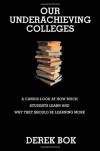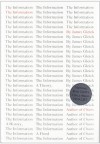Currently reading
McGlue
Knife Fight and Other Struggles
Far from the Tree: Parents, Children, and the Search for Identity
The Good Lord Bird
Ancillary Justice
Our Underachieving Colleges: A Candid Look at How Much Students Learn and Why They Should Be Learning More (New Edition)
Dissident Gardens
Nightmare Movies: Horror on Screen Since the 1960s
The Information: A History, a Theory, a Flood
Complete Novels
 Even a casual, concise summary of this book might disrupt some of the pleasures of discovery which amplify (if not wholly define) the book's strength. So I'll try to avoid saying much about the plot beyond its opening premise, at least in the review (but comments are fair game for any revelation). It's a damn good mystery-thriller, maybe even the best I've read in some time... 4.5 rather than 5 stars.
Even a casual, concise summary of this book might disrupt some of the pleasures of discovery which amplify (if not wholly define) the book's strength. So I'll try to avoid saying much about the plot beyond its opening premise, at least in the review (but comments are fair game for any revelation). It's a damn good mystery-thriller, maybe even the best I've read in some time... 4.5 rather than 5 stars.The cold open (ahem) in far-north rural Sweden reveals a massacre of almost a whole village. Each home's residents are brutally sliced up, pets not spared the bodily fragmentation, except for one victim merely (almost gently) given a quick fatal stab and three residents spared the sword.
The revelations manifest many of Mankell's narrative skills: a painstaking but swift-moving observation of details, the shock of brutality neither muted nor melodramatically exploited, a knack for crafting a situtation that confounds. And protagonists--here in the opening a couple of sharply-drawn small-town detectives, later proliferating to a small array of strong women--who care, who elicit our concern, who think and feel and act in ways that resist the generic conventions (no white or dark knights, everyone a wee bit angsty but not wracked with the kind of boozeswilling existential cynicism that is so dully common).
The book does some fairly startling narrative tricks, shifting period and location in ways that reframe the novel as less a local mystery than a geopolitical thriller, and I say that last cautiously. Mankell has always impressed for his attention to the social politics which a good crime novel can critically engage, and his Wallander mysteries are packed with references to economic disruptions in the new Europe, the lingering strains of cold-war politics in a new multinational-corp world, the pervasive underpinnings of colonization and global poverty affecting even those northern Europeans imagining themselves safely distanced (from current problems and historical crimes). But here Mankell doesn't just knot (and then unravel) such concerns in this mystery, but uses the opening crime almost as MacGuffin, a sneaky compelling flourish in one hand while the other sets up the magic. I think some readers seem a bit annoyed by the way this "stretches belief" about that mystery, but for me the book was far more interested in--and interesting about--that often-brilliant examination of the history and current politics of China.
But it isn't the kind of sweeping (generalizing) conspiratorial thriller so common in the airports, either. The book is grounded by its characterizations, its attention to the police-procedural mode (where local scenes and details mean everything--or nothing, and the reader's constantly compelled to try to differentiate), its sophistication about its political plotting.
I loved it.












